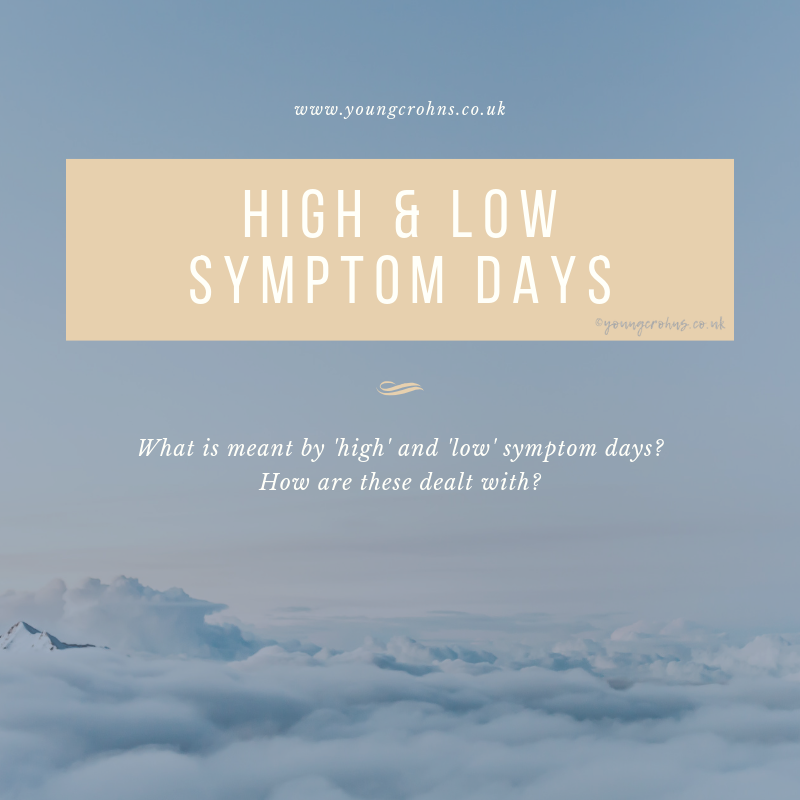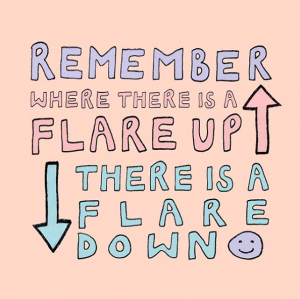
High and Low Symptom Days
One of the worse things about IBD is having unexpected flare ups.
 You could be perfectly find and then out of nowhere, a deep burning pain starts to build. It’s uncomfortable, unpredictable and can last anywhere from minutes to hours. The best we can do is try to always prepare for it – having heat wraps, painkillers and medications, safe food or drink options, and natural remedies on standby. And as much as it sucks, try to remind yourself that what goes up must come down.
You could be perfectly find and then out of nowhere, a deep burning pain starts to build. It’s uncomfortable, unpredictable and can last anywhere from minutes to hours. The best we can do is try to always prepare for it – having heat wraps, painkillers and medications, safe food or drink options, and natural remedies on standby. And as much as it sucks, try to remind yourself that what goes up must come down.
I’ve lived with Crohn’s Disease for almost a decade now and I still sometimes naively assumed that after a few weeks, tests, medications, I would return to my “normal” life. But when the weeks turned to months; that naivety fades quickly.
And while I’ve had several ups and downs with my disease, I’ve had practice to know what works best for me in terms of management – not just disease management, symptom management, medication management – but “life” management too. The way that I operate on a daily basis, whether in an active flare or not, almost always comes down to having a plan, or planning to plan.
Symptom Plans
In my time with Crohn’s, there have been many different types of plans I’ve needed at one time or another:
- There was the highly symptomatic, must go to the hospital plan; involving clearing my schedule completely, and making sure my people knew where I was.
- There was the high symptomatic, at home plan; involving work contingencies, moving and cancelling plans, managing the house, and my food/drink intake.
- Then there was the minimally symptomatic, at home plan; which mostly involved living my regular life with some IBD adjustments.
- And finally, there was the non-symptomatic plan; which meant being prepared at any time for one of the above plans to need to be activated, but always involved having a packed hospital bag ready, just in case.
You might be thinking this is overkill and going overboard with planning but it fitted my personality and it was a good way to help me control my own thoughts about my chronic illness in the early years. As things settled down, I would forget about my Crohn’s plans and live. That was until, I had surgery.
What I’ve experienced more of these last couple of years, is high and low symptoms days; especially in the time periods following my major surgeries.
For each of us with a chronic illness, ‘high’ and ‘low’ symptom days look and feel very different.
These are those days when I am medically not experiencing any disease activity but my disease impacts on other aspects of my body and life – for instance; a high symptom days for me can be when my fatigue is high, or my hydration has been sub-part for that day. A low symptom day might just be disturbed sleep or a bag leak from my stoma.
For the most part, I will stay home on high symptom days. And on low symptom days I will head out and go about my life as normal. My partner sees my high symptom days first hand, as he lives with me, but that has only been a recent development in our relationship. However, some times I do have commitments that I want to attend and I will go, even if it’s a high symptom day.
Do I like people seeing me at my lowest, pain and disease wise? Not really but it keeps it real. Choosing to ‘hide’ away when I’m in pain, fatigued or dehydrated is not selfish or secretive; it’s just what I need to do to feel better.
Do I wish I didn’t have my invisible illness? Yes, sometimes I do. I’d love to have a long and steady run of good days when I don’t cancel anything, can do things without a planning session or without resting before hand.
Do I get frustrated? Yes. I do not have active disease, but I have subsequent issues following surgeries and disease progression. Those getting frustrating at times but I can cope with them. I remind myself that it won’t last forever and if it does, it becomes a new normal. Adapting and surviving is human nature, so my illness just likes to ramp that aspect up for me. It’s not personal, it’s just how it is, unfortunately.

Do you have any questions or queries? Or just want to share your own experiences? You can leave me a reply here or leave comments via my social media accounts – on Twitter, find my blog page on Facebook and over on Instagram
Further Reading:
InflammatoryBowelDisease.net – What’s it Like Experiencing an IBD Flare? – Planning: Life & Routine with IBD



